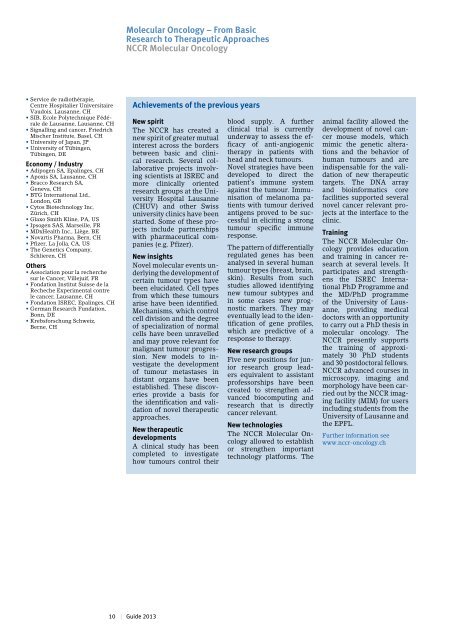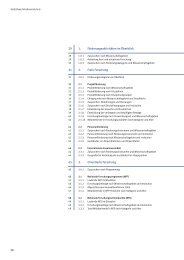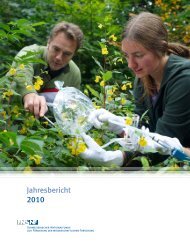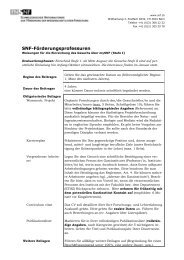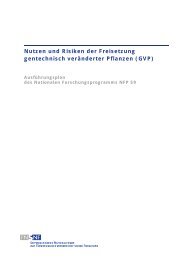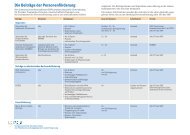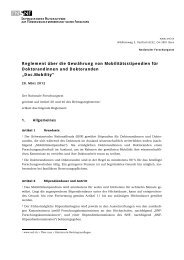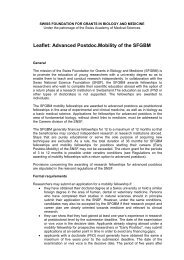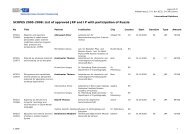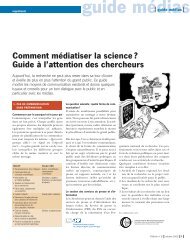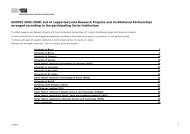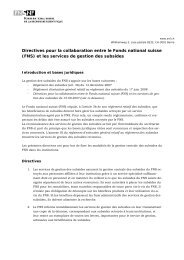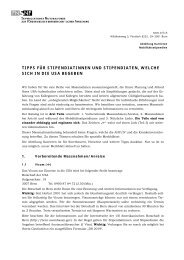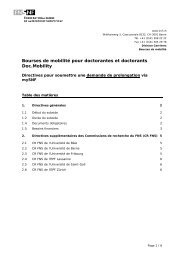NCCR Guide 2013 - Schweizerischer Nationalfonds (SNF)
NCCR Guide 2013 - Schweizerischer Nationalfonds (SNF)
NCCR Guide 2013 - Schweizerischer Nationalfonds (SNF)
You also want an ePaper? Increase the reach of your titles
YUMPU automatically turns print PDFs into web optimized ePapers that Google loves.
Molecular Oncology – From Basic<br />
Research to Therapeutic Approaches<br />
<strong>NCCR</strong> Molecular Oncology<br />
• Service de radiothérapie,<br />
Centre Hospitalier Universitaire<br />
Vaudois, Lausanne, CH<br />
• SIB, Ecole Polytechnique Fédérale<br />
de Lausanne, Lausanne, CH<br />
• Signalling and cancer, Friedrich<br />
Mischer Institute, Basel, CH<br />
• University of Japan, JP<br />
• University of Tübingen,<br />
Tübingen, DE<br />
Economy / Industry<br />
• Adipogen SA, Epalinges, CH<br />
• Apoxis SA, Lausanne, CH<br />
• Bracco Research SA,<br />
Geneva, CH<br />
• BTG International Ltd.,<br />
London, GB<br />
• Cytos Biotechnology Inc,<br />
Zürich, CH<br />
• Glaxo Smith Kline, PA, US<br />
• Ipsogen SAS, Marseille, FR<br />
• MDxHealth Inc., Liège, BE<br />
• Novartis Pharma, Bern, CH<br />
• Pfizer, La Jolla, CA, US<br />
• The Genetics Company,<br />
Schlieren, CH<br />
Others<br />
• Association pour la recherche<br />
sur le Cancer, Villejuif, FR<br />
• Fondation Institut Suisse de la<br />
Recheche Experimental contre<br />
le cancer, Lausanne, CH<br />
• Fondation ISREC, Epalinges, CH<br />
• German Research Fundation,<br />
Bonn, DE<br />
• Krebsforschung Schweiz,<br />
Berne, CH<br />
Achievements of the previous years<br />
New spirit<br />
The <strong>NCCR</strong> has created a<br />
new spirit of greater mutual<br />
interest across the borders<br />
between basic and clinical<br />
research. Several collaborative<br />
projects involving<br />
scientists at ISREC and<br />
more clinically oriented<br />
research groups at the University<br />
Hospital Lausanne<br />
(CHUV) and other Swiss<br />
university clinics have been<br />
started. Some of these projects<br />
include partnerships<br />
with pharmaceutical companies<br />
(e.g. Pfizer).<br />
New insights<br />
Novel molecular events underlying<br />
the development of<br />
certain tumour types have<br />
been elucidated. Cell types<br />
from which these tumours<br />
arise have been identified.<br />
Mechanisms, which control<br />
cell division and the degree<br />
of specialization of normal<br />
cells have been unravelled<br />
and may prove relevant for<br />
malignant tumour progression.<br />
New models to investigate<br />
the development<br />
of tumour metastases in<br />
distant organs have been<br />
established. These discoveries<br />
provide a basis for<br />
the identification and validation<br />
of novel therapeutic<br />
approaches.<br />
New therapeutic<br />
developments<br />
A clinical study has been<br />
completed to investigate<br />
how tumours control their<br />
blood supply. A further<br />
clinical trial is currently<br />
underway to assess the efficacy<br />
of anti-angiogenic<br />
therapy in patients with<br />
head and neck tumours.<br />
Novel strategies have been<br />
developed to direct the<br />
patient’s immune system<br />
against the tumour. Immunisation<br />
of melanoma patients<br />
with tumour derived<br />
antigens proved to be successful<br />
in eliciting a strong<br />
tumour specific immune<br />
response.<br />
The pattern of differentially<br />
regulated genes has been<br />
analysed in several human<br />
tumour types (breast, brain,<br />
skin). Results from such<br />
studies allowed identifying<br />
new tumour subtypes and<br />
in some cases new prognostic<br />
markers. They may<br />
eventually lead to the identification<br />
of gene profiles,<br />
which are predictive of a<br />
response to therapy.<br />
New research groups<br />
Five new positions for junior<br />
research group leaders<br />
equivalent to assistant<br />
professorships have been<br />
created to strengthen advanced<br />
biocomputing and<br />
research that is directly<br />
cancer relevant.<br />
New technologies<br />
The <strong>NCCR</strong> Molecular Oncology<br />
allowed to establish<br />
or strengthen important<br />
technology platforms. The<br />
animal facility allowed the<br />
development of novel cancer<br />
mouse models, which<br />
mimic the genetic alterations<br />
and the behavior of<br />
human tumours and are<br />
indispensable for the validation<br />
of new therapeutic<br />
targets. The DNA array<br />
and bioinformatics core<br />
faci lities supported several<br />
novel cancer relevant projects<br />
at the interface to the<br />
clinic.<br />
Training<br />
The <strong>NCCR</strong> Molecular Oncology<br />
provides education<br />
and training in cancer research<br />
at several levels. It<br />
participates and strengthens<br />
the ISREC International<br />
PhD Programme and<br />
the MD/PhD programme<br />
of the University of Lausanne,<br />
providing medical<br />
doctors with an opportunity<br />
to carry out a PhD thesis in<br />
molecular oncology. The<br />
<strong>NCCR</strong> presently supports<br />
the training of approximately<br />
30 PhD students<br />
and 30 postdoctoral fellows.<br />
<strong>NCCR</strong> advanced courses in<br />
microscopy, imaging and<br />
morphology have been carried<br />
out by the <strong>NCCR</strong> imaging<br />
facility (MIM) for users<br />
including students from the<br />
University of Lausanne and<br />
the EPFL.<br />
Further information see<br />
www.nccr-oncology.ch<br />
10 | <strong>Guide</strong> <strong>2013</strong>


